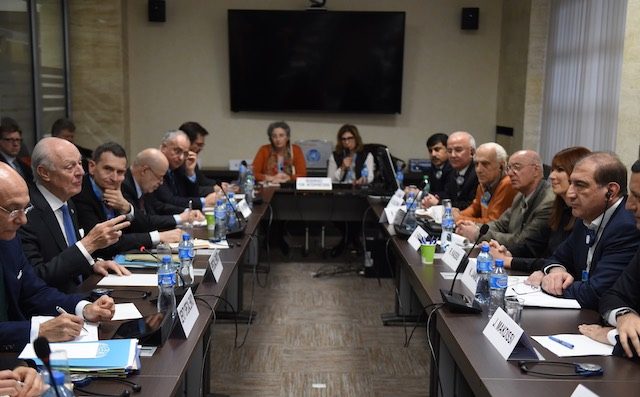SUMMARY
This is AI generated summarization, which may have errors. For context, always refer to the full article.

GENEVA, Switzerland – Peace talks to end Syria’s brutal war broadened Wednesday, March 16, to include an opposition group close to Moscow, as the UN intensified efforts to find a political solution to the 5-year conflict.
UN mediator Staffan de Mistura met for the first time late Wednesday with an umbrella delegation including the so-called Moscow Group, which are demanding an equal seat at the negotiating table.
That would be hotly contested by the “official” opposition High Negotiations Committee (HNC), which insists it alone must represent the opposition in the talks.
The UN did not clarify what role the new group would play in the negotiations but co-president Randa Kassis told reporters “We are here as a negotiating delegation.”
The entry into the Geneva talks of the Moscow Group, along with the so-called Cairo and Istana groups, followed Russia’s surprise decision to withdraw most of its forces from Syria, where they had been fighting in support of President Bashar al-Assad.
Pressure on Assad?
Western governments voiced hopes the continuing pull-out could boost the talks by pressuring Assad.
Russia has said its 5-month bombing campaign in Syria had helped push back the jihadists and analysts say it has allowed Assad’s forces to gain ground and cement their hold on key parts of the country.
But the US military said Wednesday it had seen no significant reduction in Russia’s combat power in the war-torn country.
In Geneva, it was not immediately clear what impact the inclusion of the pro-Moscow group would have on the talks, or whether it was a gesture from de Mistura to Russia following the pullout.
The UN envoy has said Russia’s action could have a “positive” impact on efforts to end the conflict and that Moscow’s announcement on the day negotiations opened was “not a coincidence”.
After multiple failed peace efforts, de Mistura has said he sees added “momentum” in the current round of dialogue, which comes as a ceasefire imposed on February 27 remains broadly in place.
His tentative optimism was backed by US Secretary of State John Kerry who heads to Moscow next week to discuss the peace drive.
“We may face the best opportunity that we’ve had in years to end (the war),” Kerry said Tuesday.
The conflict has killed more than 270,000 people and send millions fleeing, many seeking new lives in Europe where the influx of refugees and migrants from the Middle East, Africa and Asia has created a huge headache for the EU.
The Moscow Group is tolerated by Damascus and has not insisted on Assad’s departure as a condition for creating a transitional government, which is an unequivocal demand of HNC.
It represents a more “rational” opposition, which can serve as “a bridge between the regime and the (HNC) delegation,” said Qadri Jamil, co-president of the group and Syria’s former deputy premier, who was sacked by Assad in 2013 and is now viewed by Damascus as a moderate opponent.
During their meeting with de Mistura, the Moscow Group handed over a proposed seven-point program, calling among other things for the creation of a “transitional governing body” in Syria, “the definition and content of which should be reached through negotiations.”
Regime delegation head Bashar al-Jafaari appeared to welcome the arrival of the new opposition faction.
“No one can monopolise the opposition,” Jafaari said after meeting with de Mistura Wednesday morning, in a reference to the HNC.
‘Lift embargo’ on Kurds
The latest spat between rival camps highlights the huge obstacles standing in the way of a peace deal.
“Things are still very complicated,” de Mistura’s deputy Ramzy Ezzeldin Ramzy said, while noting “important progress” had been made in the first three days of talks.
Wrangling over delegates has hampered past negotiations, especially the contentious issue of including Syrian Kurdish groups, which control large stretches of northern Syria but have not been invited to Geneva.
The Moscow Group said it was working to “lift the embargo” against bringing in Kurdish delegates.
Kurdish-led parties meeting in northern Syria Wednesday were expected to declare a new federal system in areas under their control, a move aimed at solidifying their autonomy, but which could complicate efforts to forge a united Syria.
Washington warned it would not recognize such an attempt.
Regime delegation head Bashar al-Jaafari told reporters that it would prove pointless.
“The Syrian Kurds are an important component of the Syrian people… so betting on creating any kind of divisions among the Syrians will be a total failure,” he said. – Layal Abou Rahal and Ben Simon, AFP / Rappler.com
Add a comment
How does this make you feel?
There are no comments yet. Add your comment to start the conversation.